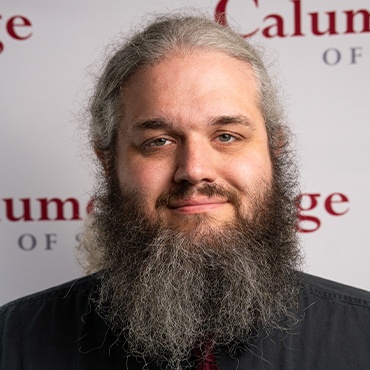
Biomedical Science Program
Calumet College of St. Joseph’s Biomedical Science program offers a pathway to a career in health care or a foundation for graduate school.
The Biomedical Science degree at Calumet College of St. Joseph meticulously prepares students for diverse healthcare careers, including nursing, medicine, dentistry, optometry, public health, pharmacy, pathology, occupational therapy, and physical therapy.
For graduates pursuing advanced education, the program equips them with the essential skills and knowledge for success in advanced degrees in biology, chemistry, or biochemistry.
Our Biomedical Science faculty are dedicated to excellence in teaching and learning, community service, research, and student support. We foster strong community partnerships and promote lifelong learning to enhance healthcare excellence and improve quality of life.
IN THE BIOMEDICAL SCIENCE PROGRAM, YOU WILL:
- Advance your scientific knowledge and critical thinking skills
- Hone your research skills and problem-solving ability
- Develop specific expertise in areas of sample preparation, data analysis, scientific calculations and more
- Sharpen your communication skills, verbally and in writing
- Solidify your awareness of the relevance of biological and chemical knowledge to human health and welfare
Request Information
Program Highlights
$100,890 Median Salary
Biomedical scientists have promising earning potential, with a median salary of $100,890 per year and entry-level positions starting at $60,000.
10% Job Growth Increase by 2032
According to BLS.gov data, the demand for biomedical scientists is projected to grow significantly, driven by advancements in medical research and biotechnology.
Hands-On Undergraduate Research Opportunities
Students have access to well-equipped laboratories and modern instruments, providing valuable hands-on research experience and practical skills development.
Faculty
Ahmed Lakhani, Ph.D.
Daniel Stroik, Ph.D.
David Harnish, M.L.I.S.
Michael Keiderling, Ph.D.
Tracy Stone, Ed.D.
Career
Options
Career Options with this major include but are not limited to:
- Optometrists – $131,860
- Veterinarians – $119,100
- Medical Scientists – $100,890
- Epidemiologists – $81,390
- Forensic Science Technicians – $64,940
- Biological Technicians – $51,430
In addition, Biomedical Science prepares students for graduate school, medical school, physical therapy school, occupational therapy school, nursing school, pharmacy school, veterinary medical school, and dental school.
Calumet College of St. Joseph has a Memorandum of Understanding with Ross University School of Medicine. This provides a pathway to Ross University School of Medicine for eligible CCCS Biomedical Sciences graduates. Talk to your enrollment counselor or program director to learn more.

Frequently Asked Questions
A degree in Biomedical Sciences opens doors to a wide range of career opportunities. Graduates can pursue careers in various fields, including:
- Healthcare: Many students become medical doctors, dentists, or pharmacists.
- Research: Graduates can work as research scientists in academic, government, or private laboratories, conducting experiments and contributing to advancements in medical knowledge.
- Biotechnology and Pharmaceuticals: Opportunities exist in biotech and pharmaceutical companies’ product development, quality control, and regulatory affairs.
- Education: Some graduates become educators, teaching biology, chemistry or health-related courses at various educational levels.
- Laboratory Management: With additional experience, graduates can manage clinical or research laboratories.
Students in the Biomedical Sciences program can engage in various research projects that align with their interests and career goals. These might include:
- Basic Research involves exploring fundamental Research in chemical and biological processes such as cellular signaling, genetics, and molecular biology.
- Collaborative Projects: Working alongside faculty on interdisciplinary Research that might involve chemistry, biochemistry, or biology.
- Capstone or Independent Projects: programs include a capstone project or independent Research, where students design and execute their research under faculty supervision.
Biomedical Sciences programs offer internships or cooperative education (co-op) opportunities. These programs allow students to gain hands-on experience in real-world settings, such as:
- Hospitals and Clinics: Interning in clinical settings to gain experience in patient care, diagnostics, or medical Research.
- Research Laboratories: Working in academic or commercial labs to develop practical research skills.
The prerequisites for enrolling in a Biomedical Sciences program typically include:
- High School Diploma: Completion of secondary education.
- Strong Background in Science and Math: Courses in biology, chemistry, physics, and mathematics are essential. Advanced Placement (AP) courses in these subjects can be advantageous.
The Biomedical Sciences program is designed to provide a strong foundation in the biological, chemical and physical sciences, essential for success in medical school or other advanced degrees. Preparation includes:
- Rigorous Coursework: Courses in anatomy, physiology, biochemistry, and genetics are aligned with medical school prerequisites.
- Research Experience: Students gain hands-on research experience, which is highly valued in medical school applications.
- Advising and Support: faculty advisors help students navigate the medical school application process, including preparation for the MCAT.
Graduation requirements for the Biomedical Sciences program generally include:
- Completion of Core Coursework: Students must complete a set number of credit hours in core science courses, including biology, chemistry, physics, and mathematics.
- Minimum GPA: Students must maintain a minimum GPA, typically around 2.5 to 3.0, to graduate with a Biomedical Science degree.
Program
Objectives and requirements
Upon completion of this program, it is expected that students will:
Scientific Knowledge and Critical Thinking:
- Students will demonstrate a level of competency for understanding core principles.
- Students will demonstrate the ability to locate and critically evaluate scientific information.
Research Skills and Problem-Solving Ability:
- Students will demonstrate the ability to design studies to test the biological and chemical hypothesis.
- Students will demonstrate the ability to learn independently and to critically evaluate the significance of research results.
Specific Expertise:
- Students will develop and justify a range of sample preparation, data analysis, various scientific calculations (enzyme kinetics, molarity, stoichiometry).
- Students will be able to validate techniques of analytical balances, autoclave, UV/Vis spectrometer, IR spectrometer, gel electrophoresis, simple and fractional distillation, PCR, DNA extraction, titrations, pH analysis and normalization.
Communication:
- Students will demonstrate the ability to communicate the results of scientific research verbally and in writing.
Ethics and Advocacy:
- Students will demonstrate the ability to design studies that meet professional ethical standards.
- Students will demonstrate an awareness of the relevance of biological and chemical knowledge to human health and welfare.
120 Credit Hours
The following courses are required for a baccalaureate degree:
38 credit hours General Education
Students must complete the following:
- BIOL 115 Cell and Evolution (Lecture, Lab, Supplemental)
- MATH 104 Precalculus
- PHIL 200 Great Philosophical Ideas
- PSY 100 Introduction to Psychology
- SOCL 210 General Sociology
7 credit hours in Introductory courses
- MATH 171 Principles of Statistics
- CHEM 200 General Chemistry I (Lecture, Lab, Supplemental)
48 credit hours in Mid-Level Requirements
- BIOL 205 Development, Structure and Evolution (Lecture, Lab, Supplemental)
- BIOL 215 Medical Terminology
- BIOL 300 Human Anatomy and Physiology I (Lecture, Lab)
- BIOL 305 Human Anatomy and Physiology II (Lecture, Lab)
- BIOL 372 Biomedical Health Research Literacy I
- BIOL 373 Biomedical Health Research Literacy II
- CHEM 143 Nutrition (Lecture, Lab)
- CHEM 205 General Chemistry II (Lecture, Lab, Supplemental)
- MATH 230 Calculus I
- MATH 231 Calculus II
- MATH 310 Calculus III
- PHYS 300 Physics I (Lecture, Lab)
- PHYS 305 Physics II (Lecture, Lab)
35 credit hours in Upper-Level Requirements:
- BIOL 230 Microbiology (Lecture, Lab)
- BIOL 315 Mendelian and Molecular Genetics (Lecture, Lab)
- BIOL 360 Principles of Immunology
- CHEM 310 Organic Chemistry I (Lecture, Lab)
- CHEM 311 Organic Chemistry II (Lecture, Lab)
- CHEM 320 Biochemistry (Lecture, Lab)
- CHEM 430 Instrumentation Analysis (Lecture, Lab)
- CHEM 445 Physical Chemistry I (Lecture, Lab)
- CHEM 446 Physical Chemistry II (Lecture, Lab)
You Belong
at Calumet College of St. Joseph!








